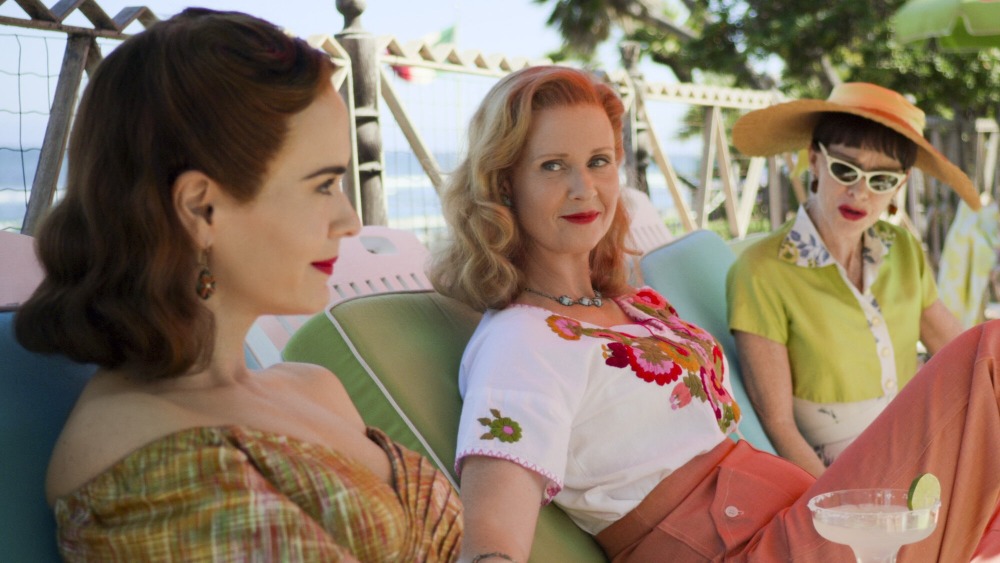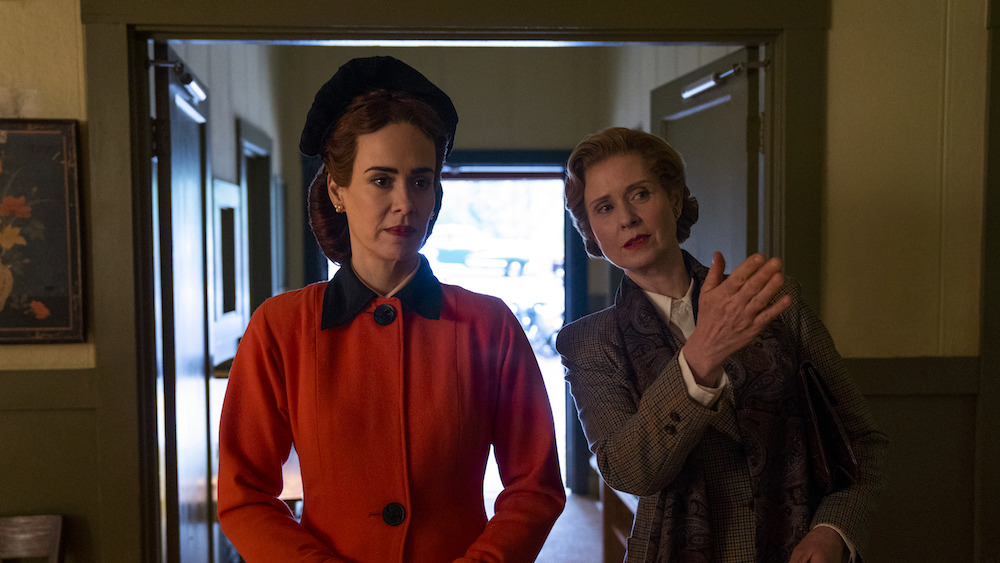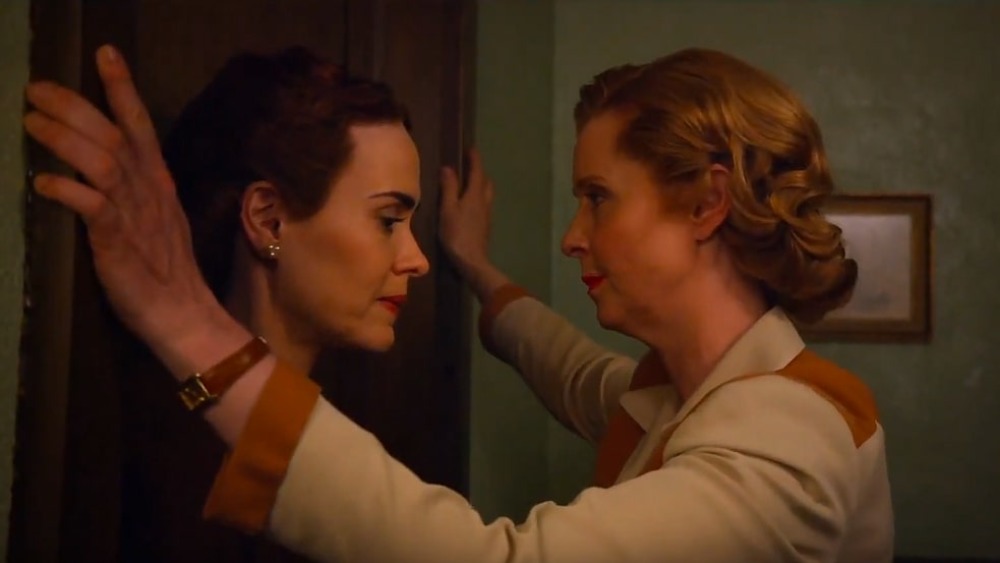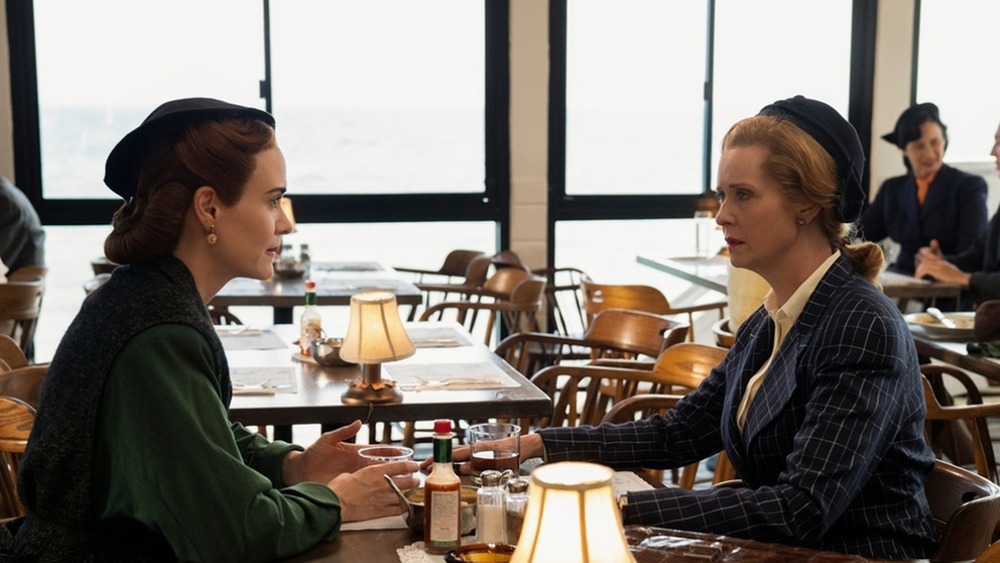Ratched's Sarah Paulson On Mildred's Relationship With Gwendolyn
Ryan Murphy's Netflix series Ratched hooked fans right from the first titillating moments of the show, snagging a place in Netflix's Top Ten for weeks after its release. Based on the character of Mildred Ratched (Sarah Paulson) from Ken Kesey's novel and Miloš Forman's film One Flew Over the Cuckoo's Nest, the prequel series puts a modern spin on the deplorable treatment psychiatric patients faced in the 1940s. Ratched places a significant focus on the disturbing and outdated notion that being a lesbian is a mental illness that must be "cured" through brutal means like hydro shock therapy. Sadly, the concept still resonates with a 2020 audience, as conversion therapy — a manipulative tactic to force the LGBTQ+ community to deny their own identity — still exists today, though efforts to terminate the practice are finally making some headway.
Throughout the series, viewers watch Ratched go from taking part in these horrendous treatments to finding her own LGBTQ+ identity when she starts dating Gwendolyn Briggs (Cynthia Nixon). Netflix has already greenlit Ratched for a second season, so perhaps fans will discover what exactly turned Ratched from being in a loving relationship with a woman to the hardened, overtly religious, and arguably homophobic nurse we see in Cuckoo's Nest. But until then, there's enough Mildred and Gwendolyn content to make us forget that things are probably not going to end well for the pair.
Looper took part in a Ratched press conference, during which Sarah Paulson and Cynthia Nixon opened up about their characters' relationship.
Ditching guilt and finding joy
When asked if Ratched will resonate with LGBTQ+ fans because Mildred struggles to embrace her truest self, Paulson explains, "I think the reason I get hung up with [this] question is... although it has many elements about it that are queer-centric, I think somehow this is not a story of a woman who is... on her journey. There is a consequence of discovering that part of herself, but it is not a story of a woman who is struggling with that identity." She adds, "It's a story at its heart of a woman who wants to absolve herself from the horrible guilt she's been carrying about abandoning the most important person in her life at a very young age and living with that guilt and doing whatever she must do to be reunited with this person, only to ultimately have him forsake her." As it turns out, her relationship with Gwendolyn helps her do exactly that.
"The only place where joy lives is in Mildred's relationship with Gwendolyn. And it's the first time in Mildred's life, I believe since she was a child with her brother, pre all these [sorts] of horrible things that were happening, where she has any opportunity for happiness and for joy," Paulson reasons. "And I love that element of this story that, within this show, the queer component is one of love and joy and opportunity for Mildred, for the very first time, to feel seen and to explore these parts of her."
In a way, Mildred makes Gwendolyn stronger and more confident, while Gwendolyn brings out Mildred's softer side — something unexplored by the source material. "I mean, all the stuff that happens with Gwendolyn, with Mildred, all of that confidence that you see that Mildred has, or that she's feigning, goes completely away," Paulson continues. "She doesn't know how to access that real part of herself. So there is great, great joy in that component, for me, as a member of the community." Paulson, who came out to the world by kissing Cherry Jones at the 2005 Tony Awards, took a few seconds to gather her thoughts before continuing.
Keeping the box open to interpretation
"I think every story resonates with its audience because there is some revelation that happens that makes a person feel connected to the story," Paulson says. "Any opportunity you have to reveal yourself to an audience means they have a way into something where they, I think, feel a little bit less alone in the world." Noting that anyone can feel a commonality with Ratched for their own reasons, she continues, "I guess I sort of feel that any art form, whether it's music or a book, a novel, poetry, anything — there's always an opportunity to reveal yourself. And I think that that's what's happening here."
While the original novel and film set the tone for her character, Sarah Paulson made Ratched her own. "I don't put it in a box of any kind in terms of how it's going to be received or what's going to make it more digestible for anyone," she adds. "I think Mildred and I think all of the characters are in some form of discovery. Nobody has landed anywhere yet. Nobody has figured anything out, totally. So it's a process, I guess."
Gwendolyn is refreshingly uncomplicated in a sea of chaos
"I think one of the, obviously, overarching themes of Ratched is not only the brutal treatments that were used against people who were deemed mentally ill but what fell under the umbrella of mental illness and what was defined as mental illness," Nixon says. The show takes place in a world where everything from daydreaming to homosexuality is seen as mental illnesses, with one of the most horrifying moments depicting a child receiving a lobotomy — an homage to Howard Dully, a child in the '40s who was forced into the procedure at 12 years old.
Nixon explains further, "And certainly, being queer is front and center, and we have so many different examples of it in the story, but we have characters who have turned to murder because, literally, that was the only way they could survive or developed other personalities as a way to not just sink and disappear and self-destruct."
On whether or not Nixon was drawn to her character for never wavering from her identity despite the time period, Nixon answers, "[Gwendolyn being] the only person, really, to wholeheartedly be advocating, like, 'Walk in the light. There is a path of light that I'm taking and that you, Mildred, could take,' was just very, very different for me and [it was] just a real challenge to particularly not have so many little cul-de-sacs to go down of a quote-unquote, complicated character."
Nixon continues, "To sort of do that and hope that it would be, I guess, interesting enough was a delightful challenge. And almost every other character has many different parts of themselves and that they're trying to kill or stamp out or suppress a bunch of those... And Gwendolyn is really the opposite. She knows she's got at least four or five pieces of her personality, but meeting Mildred is kind of the key that unlocks the door... she realizes she actually has to integrate all these parts of her personality and thinks, for the first time, it could be possible."
While we eagerly wait to see what will happen next in Gwendolyn and Mildred's relationship, all episodes of Ratched season 1 are available on Netflix.



